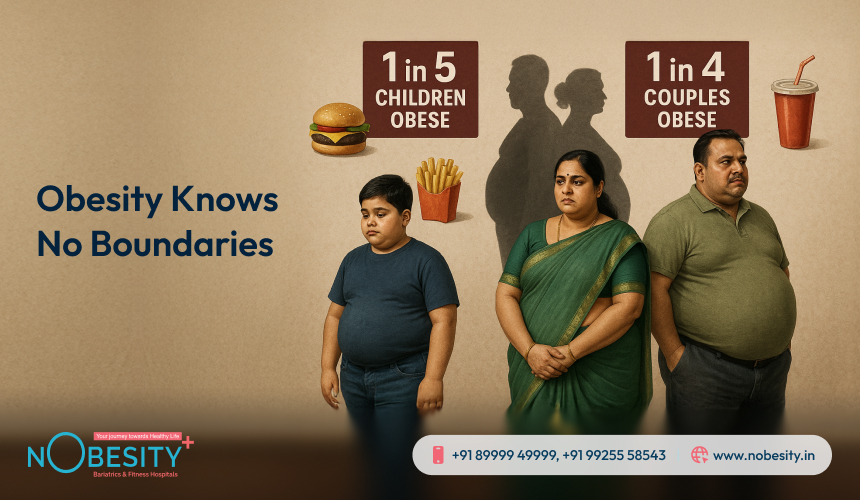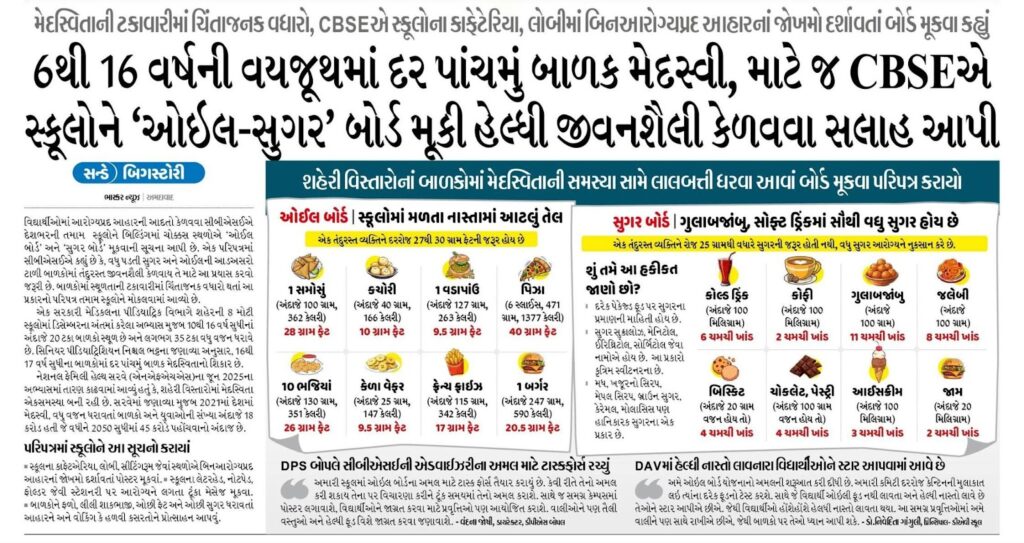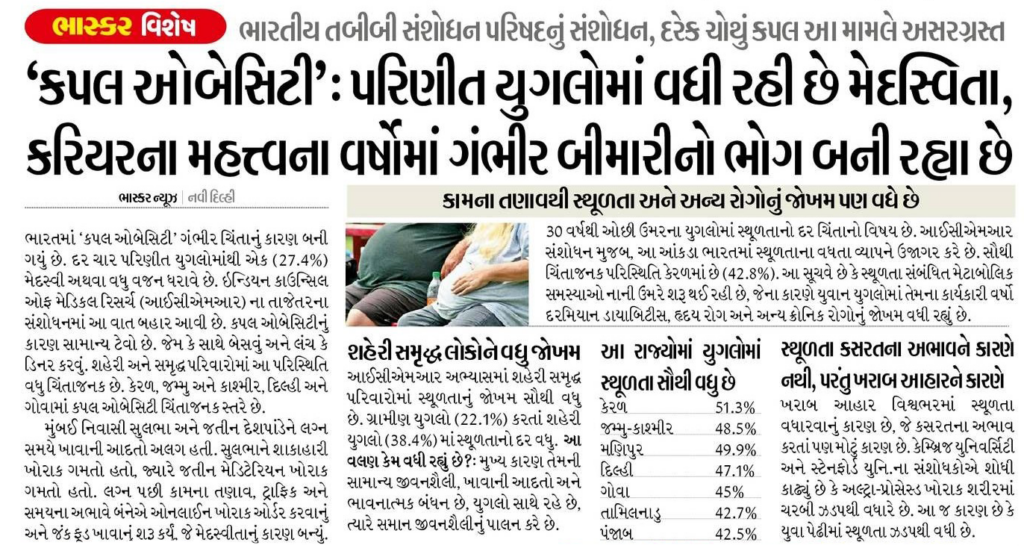Obesity Knows No Boundaries: How Indian Families, From Children to Couples, Are Facing a Silent Crisis


Walk through any metropolitan Indian neighbourhood today, and you’ll see a pattern that didn’t exist two decades ago—children with rounded bellies and couples with expanding waistlines, all battling the same silent intruder: obesity. What once seemed like an isolated adult issue or a child’s lifestyle hiccup has evolved into a full-blown family-wide health crisis.
Recent findings from the Indian Council of Medical Research (ICMR) and the National Family Health Survey (NFHS) paint a sobering picture—one in every four married couples is now overweight or obese, and nearly one in five children aged 6 to 16 shares the same struggle. This isn’t a coincidence—it’s a consequence. The link? Shared habits, everyday stressors, and a lifestyle woven with convenience and compromise.
From school canteens to late-night food delivery apps, from office stress to sedentary screen time, obesity is being passed around the family table, one meal at a time. And what we’re dealing with isn’t just excess weight. It’s an intergenerational epidemic, quietly tightening its grip on India’s urban households. As this health crisis continues to grow, more families are turning to comprehensive solutions, including surgical interventions like bariatric surgery, which can offer significant, lasting change when combined with a healthier lifestyle. But what does this rising tide of obesity mean for the health of our kids and couples? The consequences go far beyond just the physical. In the following sections, we’ll dive into the multiple health issues tied to this alarming trend and explore why addressing obesity in its early stages is crucial for the well-being of families everywhere.
Numbers don’t lie, and when it comes to obesity in India, they tell a tale that’s as startling as it is urgent.
The connection? The very people responsible for shaping a child’s lifestyle—parents—are themselves caught in unhealthy routines. What begins as skipped breakfasts, frequent food deliveries, or late-night bingeing gradually transforms into a household culture. Children, in turn, mirror these habits, absorbing them as part of their daily life. The result? A rise in childhood obesity, where growing waistlines and escalating health risks are no longer confined to adults but are increasingly seen in younger generations as well.
But the issue is more than just food. It’s lifestyle, it’s environment, it’s mindset. And it’s spreading across Indian families faster than we’re willing to admit.
The Central Board of Secondary Education (CBSE) has taken note of this alarming trend. Schools across India have been directed to put up health awareness boards in canteens and lobbies to educate children about the dangers of oil-laden and sugary foods.
Initiatives include:
Schools like DPS Bopal and DAV are already forming task forces to monitor cafeteria menus and recognise students who bring healthier options. These efforts mark a critical shift from blaming children to building healthier systems around them. But the question remains: are we doing the same at home? Children might see posters warning about oil and sugar in their canteens, but what greets them on their plate at home? The same deep-fried snacks. The same sugar-loaded treats. Awareness begins at school, but accountability begins at home.
And that’s where these school initiatives hit closer to home than we’d like to admit. The Oil Board and Sugar Board aren’t just educational props—they’re reality checks for the entire household. Let’s take a closer look at what they reveal about the foods we consider “normal.” You’ll see it echoed in the newspaper cutting below, which lays out the same hard truths.

Before we talk about lifestyle shifts, let’s look at the food that silently contributes to weight gain. Often, the meals we see as ‘light snacks’ are loaded with more fat and sugar than we realise.
These tables, inspired by CBSE’s awareness campaign, lay it bare:
How Much Oil Are We Eating? — The Oil Board
| Food Item | Serving size (G) | Fat content (G) | Calories (Kcal) |
| Samosa | 100 | 24 | 362 |
| Kachori | 50 | 10 | 166 |
| Vadapav | 127 | 9.5 | 283 |
| Pizza (6 Pcs) | 571 | 40 | 1377 |
| Bhajiya (10 Pcs) | 130 | 26 | 361 |
| Wafers | 25 | 9.5 | 147 |
| French Fries | 115 | 17 | 352 |
| Burger | 257 | 20.5 | 590 |
Fact: Adults need only about 27–30g of fat daily, but a single samosa nearly fulfils that limit!
How Sweet Is Too Sweet? — The Sugar Board
| Item/Drink | Serving Size | Sugar Content(teaspoons) | Note |
| Cold drink | 100 ml | 6 | Hidden sugar in popular drinks |
| Coffee | 100 ml | 2 | Every regular coffee adds up |
| Gulab Jamun | 100 gms | 11 | India’s favourite sugary treat |
| Jalebi | 100 gms | 8 | High sugar in traditional sweets |
| Biscuit | 20 g | 4 | Small bites, big sugar |
| Chocolate/Pastry | 100 gms | 5 | Often overlooked sugar source |
| Ice-cream | 100 ml | 3 | Appears innocent but packs sugar |
| Jam | 20 ml | 2 | Check labels carefully |
Remember: Healthy adults should not exceed 25g (~6 tsp) of sugar daily—kids need even less for optimum health.
Obesity doesn’t grow in isolation. The same habits that affect adults ripple through their children:
And here’s the twist—when one family member starts to gain weight, the rest often follow. Because habits are contagious. So are coping mechanisms. And so is denial.
Urban and affluent regions are emerging as hotspots in India’s obesity crisis. Though the national couple obesity rate stands at 27.4%, the numbers surge in cities—urban couples report a staggering 38.4% prevalence, while rural couples remain comparatively lower at 22.1%.
| State/City | Couple of Obesity Rate (%) |
| Kerala | 51.3 |
| Manipur | 49.9 |
| Jammu & Kashmir | 48.5 |
| Delhi | 47.1 |
| Goa | 45. 0 |
| Tamil Nadu | 42.7 |
| Punjab | 42.5 |
The national average stands at 27.4%, but urban couples hit 38.4% while rural couples are at 22.1%, confirming the critical role of urban lifestyle factors.

Young urban couples are increasingly vulnerable to obesity due to a combination of career pressures, sedentary lifestyles, and unhealthy eating habits. In bustling cities, the demands of work, long hours, and financial stability often overshadow personal health. With limited time for exercise and meal preparation, many couples rely on quick, calorie-dense foods, contributing to weight gain.
The urban lifestyle also encourages sitting for long periods, whether at work, in front of screens, or socializing in sedentary settings. This lack of physical activity, paired with the ease of accessing fast food and processed snacks, heightens the risk of obesity. Stress from professional pressures further exacerbates this issue, leading to emotional eating and poor food choices.
Young, urban couples often find themselves caught in a balancing act, where career demands and health are in constant conflict. The pressure to succeed professionally frequently leads to unhealthy lifestyle choices, contributing to obesity.
Young couples in urban areas often sacrifice health for career advancement. Long work hours, travel, and job pressures leave little room for exercise or meal planning. Stress from these demands can lead to emotional eating, relying on unhealthy foods for comfort, and ultimately contributing to weight gain.
Urban living has shifted family time from active engagements to sedentary activities. Instead of engaging in outdoor physical activities, couples often spend time indoors with screen-based entertainment or socializing over meals, which can result in lower physical activity levels. With the convenience of food delivery services and fast food options, maintaining a healthy diet becomes even more challenging, contributing to weight gain.
Obesity is more than a number on the scale—it quietly damages the body and mind in ways that often go unnoticed until serious complications arise.
Obesity is a profound public health emergency demanding early intervention and sustained lifestyle change to protect not only individuals but entire families and communities.
For couples battling severe obesity, bariatric surgery has emerged as a transformative option. This procedure is becoming a recognised and effective method to achieve significant, lasting weight loss. However, bariatric surgery remains a tool of last resort—especially for adults—and underscores the vital importance of cultivating healthy habits from a young age to prevent obesity in the first place.
Leading centres like NObesity in Ahmedabad exemplify excellence in bariatric care. Their expert bariatric surgeons offer personalised surgical options, advanced technology, and comprehensive pre- and post-operative support, ensuring patients receive a tailored, safe, and effective path to reclaim their health with lasting results.
Obesity today is a collective family challenge, not just an individual struggle. By embracing informed, healthier habits, paying attention to the hidden fats and sugars in daily diets, and supporting one another, Indian families can rewrite their health stories and build vibrant, resilient futures.
Centres like NObesity have become trusted partners in this journey, having performed over 9,000 successful bariatric surgeries and guiding more than 650 new patients each year with world-class care and lifelong support. We combine medical precision with compassionate, long-term support. Our team walks beside you before, during, and after surgery, ensuring that every stage of your transformation is practical, structured, and personalised.
You’ve seen the facts. You understand the path. Now take the first step. Schedule a consultation with our expert team to explore whether bariatric surgery is right for you and discover how we can help you take control of your health with confidence.